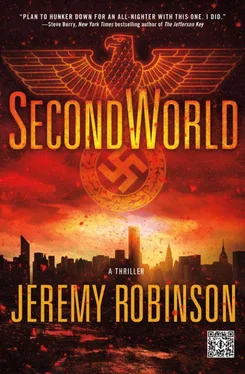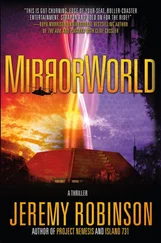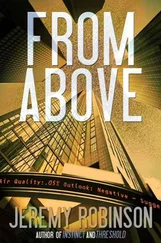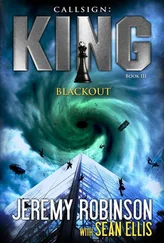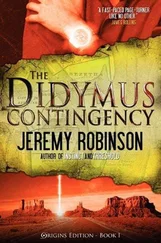“Debus, Gerlach, Oberth, and von Braun were all scientists of notoriety. The Allies were well aware of their keen minds and sought them out at the end of the war. If they’d been shot, or taken with the prototype—”
“Taken where?” Miller asked.
“We were never told.” Huber cleared his throat and stood. He wandered to the fireplace and looked at the photos on the mantel. “Anything other than capture would have raised suspicions and begun a search. Turning themselves in kept attention away from the project long enough for it to disappear. It also served another purpose that allowed the project to continue into the present day.”
“Which was?” Miller asked.
The old man rubbed a thumb over the photo of his grandkids—three smiling girls and two boys. “Recruitment.”
The word twisted Miller’s gut. Von Braun had been made the director of Marshall Space Flight Center and Debus the director of the Kennedy Space Center. They would have had access to the best and brightest U.S. scientists.
“I can see you understand the implications,” Huber said, looking at Miller. “Our former affiliation with the Nazi regime was well known. We had no trouble finding like-minded scientists. In fifteen years, von Braun and I recruited more than thirty scientists from a variety of fields. Once initiated, they were picked up and we never saw them again.”
Huber turned his attention back to the photos. “But we soon began having children, and grandchildren. And this was their home. Our families were American. And we came to love this country and its… diversity, as our own. We decided, as a group, to end the recruitment program. But it seemed our bold move was a hollow gesture. We were never contacted again.”
“Why not?” Miller asked.
“Based on the events of the last few days, I’d guess it was because we sent them everyone they needed, and every time a recruit left, we ran the risk of exposing the program.”
“So you just kept it all to yourselves?” Miller said. “Why didn’t you expose the program?”
“Just because we weren’t contacted doesn’t mean we weren’t being watched. We stayed silent for the same reason Walther Gerlach never visited his granddaughter.” He looked at Adler when he said it. Gerlach was her grandfather. “A man will suffer a great deal of guilt to protect the ones he loves.”
Miller got in front of Huber. “And now?”
Huber shook his head as a great sadness seeped into his expression. “Now, we’re all going to die.”
“When?” Miller asked. “How long do we have?”
Tears fell from Huber’s eyes and landed on the photo of his grandchildren. “The second, more massive cloud of iron particulates will arrive in five days.”
“And the targets?”
Huber’s face screwed with confusion. “Targets?”
“What cities!” Miller said.
“There is only one target,” Huber said.
One target? Miller thought. His mind ran through everything he knew. Millions were dead. Three major cities had been struck, but how could just one more achieve anything? Washington, D.C., would kill a lot, but the government would be evacuated as the first red flake fell from the sky. In fact, most cities were already preparing large-scale evacuation plans and casualties would be minimized. Hitting a city like Jerusalem might set off a regional war, but after the attack on Tel Aviv, not even the Arab world was blaming Israel. The weapon’s initial success came mostly from its effects not being known. But now, unless you were trapped with no way out, escape should be possible.
But there is always someplace to go, Miller thought, unless…
Oh no…
“The planet? They’re going to wipe out every living thing on the planet?”
“No…,” Adler said.
Huber confirmed it with a low nod.
“But won’t they be killing themselves?”
“They will survive underground. In bunkers stocked with enough raw material, seeds, and animals to begin again.”
“How will they begin again without any oxygen?” Miller asked.
“Only the lowest levels of troposphere are affected. The oxygen above that layer will remain, as will the oxygen trapped in the water and the Earth’s crust, of which forty-six percent by weight is composed of oxygen. It will not take long to replenish the troposphere and make the Earth habitable again. They’ve been working this out for seventy years. I assure you, every detail has been well planned.” He looked at Miller. “Except for you, of course. The survivor. I don’t know how you escaped Miami, but it is nothing short of a miracle that you walked out of that red hell so long after it descended.”
“You believe in miracles?” Miller asked.
“I believe in the ingenuity of man,” Huber said as he walked to the window and looked out at the lake. Miller stood behind him and a little to the side. “Perhaps you can find a way to stop them. To save my family.”
As Huber turned toward him, Miller caught sight of the canoe out on the lake. One of the men was missing and the second held what looked to be a short fishing pole. Miller realized what it was a moment too late. “Get do—”
Two shots rang out.
Glass shattered.
Blood sprayed from Huber’s chest as his body arched in pain. He hit the floor hard, facedown. Two holes had been punched in his back.
Miller dove down to the old man and turned him over. Blood oozed from his mouth, but a glint of life still remained. Huber took Miller’s arm and pulled him close. He shook, gasped, and then whispered, “The bell tolls.”
Huber’s arm fell to the side and the muscles in his face relaxed. The man, and his secrets, were gone. But that was just the beginning of their problems. There were two killers lurking outside. Miller had no idea where the second man had gone, but the sniper in the canoe had put two rounds in Huber from one hundred yards away while sitting in a wobbly boat. He had no doubt that if they tried to run, bullets would find their backs. Problems like this were best tackled head-on.
Miller crawled to his Glock and slammed the clip back home. There was only one round left, but it was better than nothing. “Stay here,” he said to Adler, and then pointed at the shotgun. “Use that if you have to. Just check your target first. Make sure it’s not me you’re shooting at.”
Miller crawled to the back door on the opposite side of the living room.
“Where are you going?” Adler hissed.
“For a swim,” he said, then cranked the door handle, gave it a shove, and ran toward the lake.
The man in the canoe took aim as Miller burst from the cabin’s back door. He fired a moment later.
And missed.
Anticipating the shot, Miller dove right, rolled to his feet, and continued his charge toward the lake. Two tall pine trees stood between the cabin and the lake and Miller put the first tree between him and the canoe. Behind the tree, there was no fear of being shot, but he’d eventually have to leave its protection to cover the distance to the dock.
When he reached the first tree, he stood sideways against it to make sure his body didn’t show, and began stripping. He kicked off his shoes, peeled off his T-shirt, and slid out of his pants. Anyone watching would think he was just an eager skinny-dipper. To live through the next portion of his journey, his timing would have to be perfect and he couldn’t allow anything to slow him down, not even his clothes.
After hearing the shooter’s weapon three times he felt fairly certain he knew the make and model. He’d seen and heard one just like it just a few days previous—a Karabiner 98k. If he was right, the man in the canoe had two shots left in the clip. If Miller could get him to waste those two it would be a race between Miller’s legs and the shooter’s reload speed.
Читать дальше
